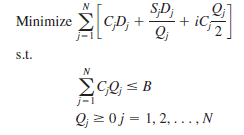
Essentials of Business Analytics 1st Edition by Jeffrey Camm,James Cochran,Michael Fry,Jeffrey Ohlmann ,David Anderson
Edition 1ISBN: 978-1285187273
Essentials of Business Analytics 1st Edition by Jeffrey Camm,James Cochran,Michael Fry,Jeffrey Ohlmann ,David Anderson
Edition 1ISBN: 978-1285187273 Exercise 11
The economic order quantity (EOQ) model is a classical model used for controlling inventory and satisfying demand. Costs included in the model are holding cost per unit, ordering cost, and the cost of goods ordered. The assumptions for that model are that only
a single item is considered, that the entire quantity ordered arrives at one time, that the demand for the item is constant over time, and that no shortages are allowed. Suppose we relax the first assumption and allow for multiple items that are independent except for a budget restriction. The following model describes this situation:
Let

The decision variables are Q j , the amount of item j to order. The model is:

In the objective function, the first term is the annual cost of goods, the second is the annual ordering cost
 and the last term is the annual inventory holding cost
and the last term is the annual inventory holding cost

a. Set up a spreadsheet model and for the following data:

b. Solve the problem using Excel Solver. ( Hint: For Solver to find a solution, you need to start with decision variable values that are greater than 0.)
a single item is considered, that the entire quantity ordered arrives at one time, that the demand for the item is constant over time, and that no shortages are allowed. Suppose we relax the first assumption and allow for multiple items that are independent except for a budget restriction. The following model describes this situation:
Let

The decision variables are Q j , the amount of item j to order. The model is:

In the objective function, the first term is the annual cost of goods, the second is the annual ordering cost
 and the last term is the annual inventory holding cost
and the last term is the annual inventory holding cost 
a. Set up a spreadsheet model and for the following data:

b. Solve the problem using Excel Solver. ( Hint: For Solver to find a solution, you need to start with decision variable values that are greater than 0.)
Explanation
The given problem is based on a non-line...
Essentials of Business Analytics 1st Edition by Jeffrey Camm,James Cochran,Michael Fry,Jeffrey Ohlmann ,David Anderson
Why don’t you like this exercise?
Other Minimum 8 character and maximum 255 character
Character 255


